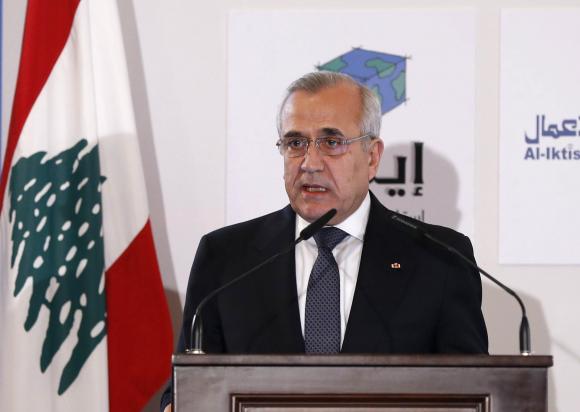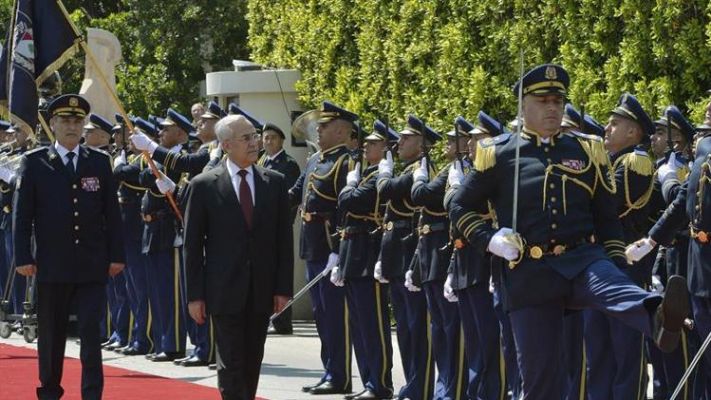khazen.org Thanks Lebanese President Michel Sleiman for unique and outstanding Leadership. Presient Sleiman keept Lebanon Strong and Safe under his mandate while the region around Lebanon is boiling.
Lebanon will Miss you!

(Reuters) – Outgoing Lebanese President Michel Suleiman said on Saturday that dialogue was the only way to overcome deep divisions in the country, which is struggling to cope with political and security spillover from Syria’s civil war.
Suleiman made his remarks during his farewell speech hours before his six-year term ends and two days after parliament failed for the fifth time to choose a successor. The impasse highlights the stark political divisions in the country.
With his departure, Lebanon enters a presidential vacancy with no clear sign when it will end.
BEIRUT: Progressive Socialist Party leader Walid Jumblatt said Saturday that he would miss the political approach of outgoing President Michel Sleiman.
“We will miss President Sleiman and the political line he established,” Jumblatt said during the farewell ceremony for the president.
Prior to the ceremony, Sleiman presented Jumblatt with the National Order of the Cedar Medal “in appreciation for his national role and political moderation and his call for dialogue among political rivals.”
Sleiman expressed hope that the PSP leader would continue to play such role “to preserve the political stability in the country.”
Both Sleiman and Jumblatt classify themselves as centrists amid the sharp political divisions in the country, mainly between the March 8 and March 14 camps
Daily Star: BEIRUT: Strengthening the state can be for the benefit of the resistance, President Michel Sleiman said during a farewell meeting with employees of Presidential Palace in Baabda and journalists.
“The resistance does not get damaged by the emergence of the state, on the contrary a state can protect its role,” he said.
“Why do we need liberation if it does not lead to a refined democratic state based on justice and equal chances?” he asked. “The goal of liberation is to be liberated from slavery, bondage to the leader… or slavery in other fields, those who sacrificed their blood want this kind of liberation and do not want political exploitation [for their sacrifices]."
Sleiman also said that despite political hindrances, he remained assured over the situation in the country.
“I am not afraid over the situation in Lebanon,” he said. “However, political obstruction has delayed many things.”
Sleiman is set to receive well-wishers in his Amchit hometown Sunday, his final day as head of state.
A family photo released on Sleiman’s official Facebook page said he would meet supporters and reassure them that this was not the end of his political life.
“On Sunday, May 25, my wife and I will meet in our Amchit residence with all those who followed up on my military, political and social path and supported the project of the state, to thank them and promise them to maintain the national work,” the photo caption said.
The president also said that women had assumed a major role in the latest round of administrative appointments.
“Twelve women were appointed in top administrative posts,” he said.
Sleiman is set to leave his office in Baabda Saturday, but political sources told the Daily Star earlier that he was adamant on co his political career.
The sources said that the 65-year-old outgoing president was seriously considering establishing a political gathering after he leaves office that could turn into a movement or a party.
The gathering would initially compromise figures from Jbeil, Kesrouan and the Metn that were close to Sleiman when he served as a president, the sources said.
Such a move would be in line with a tradition that emerged following Lebanon’s 1943 independence, with some presidents continuing to work in politics after the end of their terms, pushing principles that they had championed during their tenure.
What happens in a presidential vacuum?
BEIRUT: President Michel Sleiman is slated to leave Baabda Palace Saturday without a successor, so what happens next?
“If there is vacuum in the presidency for any reason, the powers of the president are transferred to the Cabinet,” states Article 62 of the Lebanese Constitution.
The president’s powers and duties are various.
According to the Constitution, he decides whether to issue laws passed by Parliament and then asks that they be published in the Official Gazette. He negotiates international treaties in conjunction with the prime minister, can chair Cabinet sessions and appoints the prime minister after consulting with MPs. He issues the decree to form a government in coordination with the prime minister-designate and officially accepts the resignation of ministers or fires them.
The president can also ask the Cabinet to dissolve Parliament under certain circumstances.
According to former Speaker Hussein Husseini, the Cabinet would be able to practice all of the president’s powers.
However, the move could raise concerns that the prime minister – a Sunni, in line with tradition – would infringe on the power of the Maronite president, a sensitive issue in a country governed by a delicate sectarian balance.
As a result, Husseini told The Daily Star that the government “should not make decisions that could be postponed.”
“As for things that cannot be postponed, they should be addressed by the Cabinet,” he added. “The basic principle that should be respected is that ‘there should be no power vacuum.’”
Husseini dismissed suggestions that Cabinet decisions be made unanimously during a presidential vacancy or that decrees should bear the signatures of all ministers.
He said just as under normal conditions, some Cabinet decisions would require a majority and more important ones a two-thirds majority.
There are also fears paralysis could spread to Parliament, with some Christian parties hinting that they would boycott non-urgent legislative sessions if there were a vacuum.
However, Husseini and Speaker Nabih Berri have argued Parliament could hold normal sessions during a presidential void.




